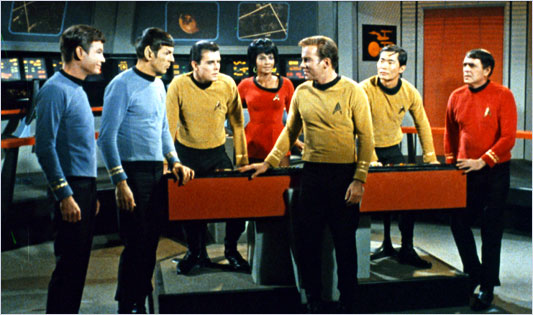Wow, I wrote this almost a year ago and never published it? Well. Better late than never. It seems to remain relevant.
A theatrical friend mentioned the quote below to me recently, and I ended up writing the following. It’s a little rough, as monologues go — it probably makes a better blog post. But I’m releasing it into the wild anyway; I’ve included a CCA license at the bottom that allows sharing and remixing.
The function of art is to do more than tell it like it is–it’s to imagine what is possible.
–bell hooks
 JEAN: (Enters, wearing Spock ears. Addresses the crowd.) You ask people who the greatest artist of the English language is and people are like: Shakespeare. Or Dickens, or maybe Victor Hugo, ignoring the fact that he’s, you know, French . . . And they’ve all got their good points, but they’re all wrong. I’ll tell you who the greatest artist of the English language is. Okay?
JEAN: (Enters, wearing Spock ears. Addresses the crowd.) You ask people who the greatest artist of the English language is and people are like: Shakespeare. Or Dickens, or maybe Victor Hugo, ignoring the fact that he’s, you know, French . . . And they’ve all got their good points, but they’re all wrong. I’ll tell you who the greatest artist of the English language is. Okay?
It’s Gene Roddenberry.
And people think I’m joking, because come on, right. “Captain Kirk” Roddenberry? “Live long and prosper” Roddenberry? Y’know, “Khaaaaaaaan”? That guy?
Yeah. Star Trek: The Original Series is the most important dramatic work of art of the 20th century.
Roddenberry created a world we’d never seen. A world where the heroes were people Middle America didn’t exactly trust. Twenty years before TOS aired, we sent Japanese-Americans to internment camps and dropped a death ray on Hiroshima. But in the 23rd century, said Gene, Hikaru Sulu could be a swashbuckling lieutenant on the bridge of the Enterprise, steering the ship through danger to safety. Nine years before TOS, the Little Rock Nine walked out of the neutral zone and into hostile territory without the aid of cloaking or shielding devices — strode through a barrage of insult and abuse harder to navigate than any asteroid belt. But in Gene Roddenberry’s future, Nyota Uhura sat on the bridge with her fellow officers, equal and not separate. With the US in the middle of its weird will-we-won’t-we Cold War and Soviet plots lurking around every corner, there was Pavel Chekov on our screens, the hot young navigator trusted with charting the Enterprise’s course. The Vulcan salute (demonstrates) is based on a Jewish blessing. And an Iowan who can’t keep his shirt on shall lead them.
And, you know, I’m not saying Star Trek is perfect, right? It’s still a product of its times. Most of the crew is white, most of the officers are male, and some of the aliens are, uh, problematic. But it’s like that old Ferengi saying, Heghlu’meH QaQ jajvam. (Beat.) Now a bunch of you are uncomfortable because I just started speaking Ferengi. (Beat.) And now the rest of you are uncomfortable because you know perfectly well that was Klingon, not Ferengi, and you don’t want your neighbor to know that you know.
But you shouldn’t be embarrassed! I mean, look, here’s the great thing about Star Trek. About the only technologies we don’t have from it are the warp drive and the transporters. Sliding automatic doors? Got ‘em. Flip phones? Check. Holodecks? The Oculus Rift releases next year. We even have replicators, I mean, we can 3D print food! We are this close to having medical tricorders! And do you think it’s a coincidence that all this tech looks like the stuff on Star Trek? Roddenberry imagined what the future could look like, and science said “Yes, that. Let’s make that happen.”
The crazy part is I can get on my iPad and order an edible 3D printed Eiffel Tower made of Soylet protein powder and have it delivered to me by a flying robot, but you make a black guy or a woman — or if you’re really feeling wacky, a black woman — the lead of your sci-fi blockbuster and people will say you’re attacking the very fabric of society. We live at 101 The Future Avenue, but we keep putting up wallpaper patterns that were already tacky in the ’60s.
And that’s depressing. It’s infuriating. It’s tempting to give up. But Gene Roddenberry wouldn’t want that. Star Trek isn’t just about Kirk losing his shirt. It’s intensely hopeful. So you shouldn’t be ashamed of loving a show that strived to show us what we could be. What we should be. We should be welcoming our enemy to sit down with us. We should be pushing boundaries and moving forward, charting the uncharted. We should be going where no one’s gone before.
We should be bold.
 This work is licensed under a Creative Commons Attribution-NonCommercial-ShareAlike 4.0 International License.
This work is licensed under a Creative Commons Attribution-NonCommercial-ShareAlike 4.0 International License.
